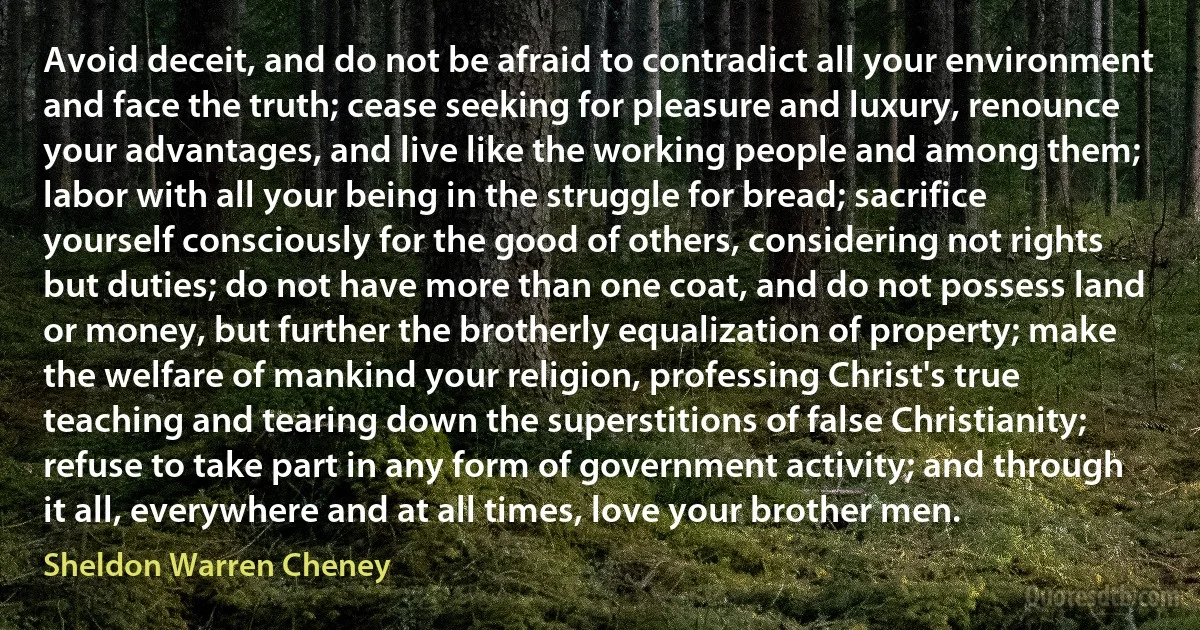Considering Quotes - page 10
During his last illness [in 1845], when no longer able to walk, he used to be wheeled about the house in a chair, and on one occasion, when stopping, as he often did, before Mr. Fox's bust, and speaking of the influence he had held over him, he added, ‘Yet he did not always use it as he might of done-one word from him would have kept me out of all the mess of the "Friends of the People,” but he never spoke it.' When I remarked that, considering he only advocated as one of that Society the principles to which he had given effect as Minister, this was hardly to be regretted, he replied, ‘that might be true, but there were men joined with them in that Society, whose views, though he did not know it at the time, were widely different from his own, and with whom it was not safe to have any communication.'

Charles Grey, 2nd Earl Grey
The lips on my upper right bicep are my girlfriend's lips. She has the most amazing lips, and I wanted to carry them around with me everywhere I go, considering I can't carry her lips physically with me. So I decided to place them in a discreet location, such as the inside part of my bicep.

Jake Owen
I think the answer of course is that space and time are not these hard external objects. Again we're, scientists have been building from one side of nature (physics) without considering the other side (life in consciousness). Neither side exists without the other. They cannot be divorced from one another or else there is no reality.

Robert Lanza
The war between the two fan clubs stopped only about 15 years ago. We both told them to stop after there were stray incidents of violence on both sides. Considering fans have killed each other for our distinguished predecessors, MGR and Shivaji Ganesan, our fans can be considered pacifists (laughs). I went ahead and set a new precedent. I turned my fan club into a social service organisation.

Rajinikanth
[In The Achieving Society, 'need for achievement' is uncovered by having individuals write stories based on pictures they see] the stories represented short samples of the things people are most likely to think about or imagine when they are in a state of heightened motivation having to do with achievement. It may be worth considering for a moment why fantasy as a type of behavior has many advantages over any other type of behavior for sensitively reflecting the effects of motivational arousal. In fantasy anything is at least symbolically possible... Overt action, on the other hand, is much more constrained by limits set by reality or by the person's abilities. Furthermore, fantasy is more easily influenced than other kinds of behavior.

David C. McClelland
Animals deserve to be treated with kindness. I love animals, and I don't believe humans can treat them as commodities and cause them harm. ... I officially became a vegan on June 1, 2009. Even though it's quite a change in terms of nutrition, I have never felt better or so healthy in my life. Considering that I'm a professional athlete, that's quite important ... I understand the impact I have in joining many groups like PETA. I don't do it to force people to be vegetarian or vegan. I just want to educate people on the subject to make this world a better place. ... Many people ... refuse to get educated on the matter because just like me, they're sensitive and afraid to make a change. But my friends, that change is not bad at all. ... Millions of people around the globe are going vegetarian for the sake of animals, their health and the environment. I encourage you to give it a try too!

Georges Laraque
I've had groups of twentysomethings saying they still talk to each other in SpongeBob memes. It's really touching, you know? You get people who have had very difficult lives, and they say that SpongeBob got them through things, which is very touching. Someone told us that they were considering suicide, and SpongeBob made them laugh, and they cycled through that phase of their life. You get everything from that, to I had a great happy childhood and SpongeBob was part of it. You get all colours of the spectrum in terms of people coming up. Not just with SpongeBob either. It may be some cartoon that was a failure, or a videogame that took an hour to record in 1996. But they say it was the biggest thing in their life at one point. It's mind-blowing. You don't realise the footprint of what you're doing is leaving behind.

Tom Kenny
The method applied by Newton to the grounding of the Infinitesimal Calculus, and which since the beginning of this century has been recognised by the best mathematicians as the only one that furnishes sure results, is the method of limits. The method consists in this, viz., instead of considering a continuous transition from one value of a quantity to another, from one position to another, or, speaking generally, from one determination of a concept to another, one considers in the first place a transition through a finite number of intervals and then allows the number of these intervals to increase so that the distances of two successive points of division all decrease infinitely.

Bernhard Riemann
The doctrines held by the early Fathers of the Church on the nature of property are perfectly uniform. They almost all admit that wealth is the fruit of usurpation, and, considering the rich man as holding the patrimony of the poor, maintain that riches should only serve to relieve the indigent; to refuse to assist the poor is, consequently, worse than to rob the rich. According to the fathers, all was in common in the beginning: the distinctions mine and thine, in other words, individual property, came with the spirit of evil.

Francesco Saverio Nitti
Our intention in this Disme is to worke all by whole numbers: for seing that in any affayres, men reckon not of the thousandth part of a mite, grayne, &c. as the like is also used of the principall Geometricians, and Astronomers, in computacions of great consequence, as Ptolome & Johannes Monta-regio have not described their Tables of Arches, Chords, or Sines, in extreme perfection (as possibly they might have done by Multinomiall numbers,) because that imperfection (considering the scope and end of those Tables) is more convenient then such perfection.

Simon Stevin
I didn't know what was going to happen with 'Teen Wolf.' I was only scheduled to do four episodes for them, but they kept me on, and I was like, 'Sweet! I'm still employed! That's awesome!' And then, they let me know that they were considering having me for the second half of the season.

Adelaide Kane
Mujahid Shah, on this occasion, repaired mosques which had been built by the officers of Alla-ood-Deen Khiljy. He broke down many temples of the idolaters, and laid waste the country; after which he hastened to Beejanuggur... The King drove them before him, and gained the bank of a piece of water, which alone divided him from the citadel, where in the Ray resided. Near this spot was an eminence, on which stood a temple, covered with plates of gold and silver, set with jewels: it was much venerated by the Hindoos, and called, in the language of the country, Puttuk. The King, considering its destruction a religious obligation ascended the hill, and having razed the edifice, became possessed of the precious metals and jewels therein.

Firishta
It is impossible to talk about slowing climate change without talking about reducing CO2 emissions. Equally, it is impossible to talk about adapting to climate change without considering how we will feed ourselves. And it is out of the question that we can adapt agriculture without conserving crop diversity.

Cary Fowler



